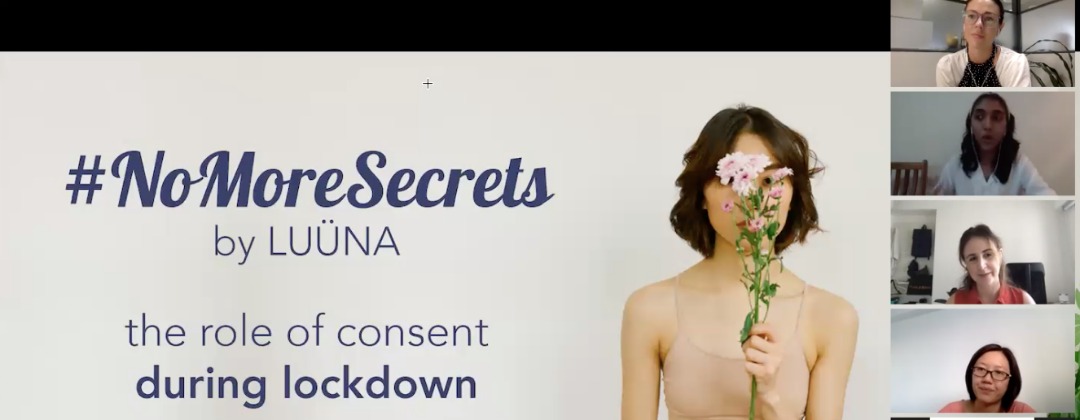-
Advocacy Theme
-
Tags
- Abortion
- Adoption
- Caregiving
- CEDAW
- Disability
- Domestic Violence
- Domestic Workers
- Harassment
- Healthcare
- Housing
- International/Regional Work
- Maintenance
- Media
- Migrant Spouses
- Migrant Workers
- Muslim Law
- National budget
- Parental Leave
- Parenthood
- Polygamy
- Population
- Race and religion
- Sexual Violence
- Sexuality Education
- Single Parents
- Social Support
- Sterilisation
- Women's Charter
A Recap: The role of consent during lockdown, an online panel by LUÜNA
May 18th, 2020 | Gender-based Violence, News, Sexual and Reproductive Health
written by Ramesh Oviya
On 7 May 2020, LUÜNA Naturals, a women-led period care company that emphasises social impact, hosted an online panel discussion on the role of consent during COVID-19, with three speakers from Singapore.
Hosted by LUÜNA founder Olivia Cotes-James, the panel was a part of the company’s event series #NoMoreSecrets, which aims to explore women’s issues traditionally shrouded in taboo.
Two of the panellists were part of AWARE’s Aim For Zero family. The first was Devika Panicker, a sexual violence survivor and spokesperson for the Aim for Zero campaign, which promotes zero tolerance towards sexual violence through training and dialogue. The next was Aim for Zero programme co-ordinator Rayann Condy. They were also joined by Dr Angela Tan, an intimacy coach who shared about working with couples and patients to understand and practice consent.
A survivor of child sexual abuse, Devika talked about the importance of teaching basic information about consent to kids from a young age, whether at school or at home. She suggested that one impediment to consent education at home was the common worry among Singaporean parents that, by speaking of sexual health, they are encouraging their children to engage in sexual activities at an earlier age than they otherwise would.
Rayann agreed, saying that the pro-abstinence sex-ed programmes taught in Singaporean schools often have the unfortunate effect of shaming and victim-blaming amongst survivors of sexual violence. It can be harder for them to speak up about uncomfortable sexual experiences if sex outside of marriage is so widely villainised. Thus, Rayann reminded everyone, when survivors do summon the courage to talk to someone about their experiences, they should be treated with empathy and made to feel heard.
In response to Devika’s point, Dr Angela cited some studies conducted in other countries that found that in schools where more holistic sex-ed was provided, the age of youth having sex increased and teenage pregnancies decreased. She went on to share that in her experience, people do find it difficult to simply enjoy their relationships as Singapore’s approach to sex-ed is “fear-driven”. She notices that people are often uncomfortable voicing out their likes and dislikes in the bedroom.
Next, Olivia asked the speakers to share about new trends they’ve observed since Singapore’s circuit breaker began.
Rayann likened the situation to a “pressure cooker”, where many sexual violence survivors have no outlets for recovery and relief. She cited the 112% increase in Helpline calls pertaining to domestic violence this April compared to last April; some of these calls come from women experiencing sexual violence at the hands of spouses, intimate partners or other relatives. Rayann mentioned a positive uptick in outreach from bystanders to AWARE: Some people, for example, are calling the Helpline because they are worried by what they are hearing from their neighbours. She finished off with details about how members of the public can support survivors, using the EER acronym: Respond with empathy, empower them, and share resources that may help.
Dr Angela reinforced Rayann’s analogy, describing the harms to one’s mental health being stuck in a confined space.
She then brought up the situation of couples stuck in different houses during the circuit breaker, and the notion of consent in cyberspace, e.g. when sharing nudes and other intimate content. Verbal communication between partners is integral in this situation, she said.
Olivia termed this “online consent”. Devika also jumped in to share how such online consent plays a part in her current relationship. She also spoke about how some of her peers face sexual expectations from their partners that they are not comfortable meeting, circling back to each person’s right to consent.
The panellists wrapped up by discussing the difficulties they have faced in trying to carve out a safe space for others while in lockdown.
During the Q&A section, an audience member asked how to encourage discussions about consent in Muslim communities. Acknowledging that, unfortunately, many religions discourage believers from learning too much about sex, Rayann asserted that one’s faith and sexuality don’t have to be “mutually exclusive”. Citing more studies, she reiterated what the panel had expressed over and over: that talking about sex does not necessarily encourage people to have sex.
As the panel discussion drew to a close, Olivia reminded participants to support survivors of sexual assault with EER, and to arm themselves with self-care tools in this trying time.




